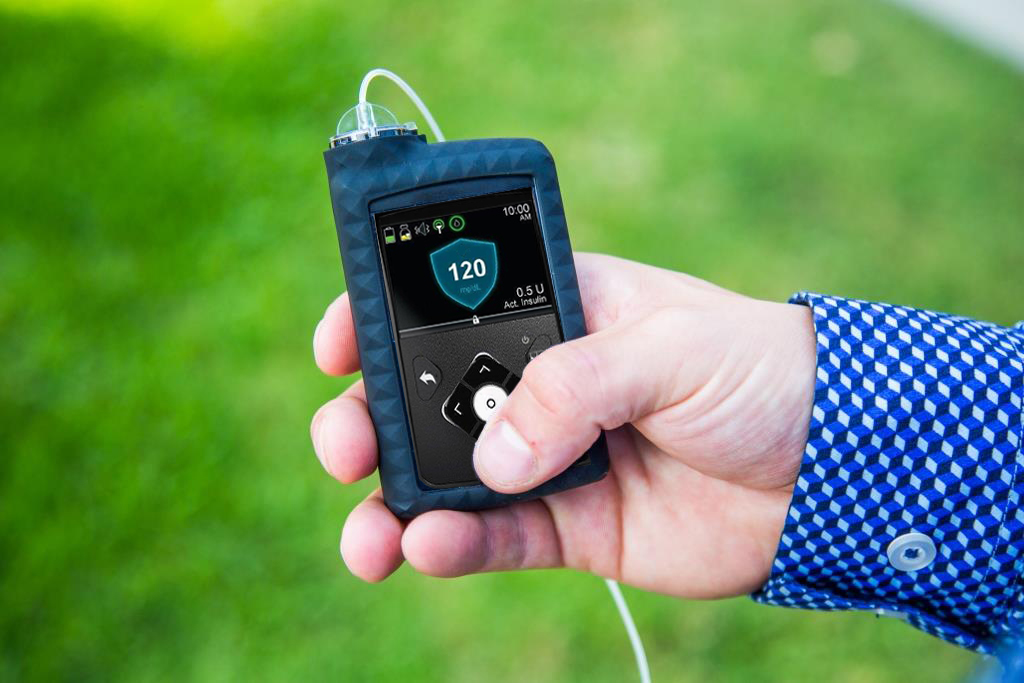Medtronic’s MiniMed 670G Hybrid Closed Loop: 1,500-Person Study!
 By Brian Levine
By Brian Levine
Comparing Medtronic’s MiniMed 670G to injections and pumps in people with type 1 diabetes, with and without CGM; enrollment to open in May at some trial locations
Clinical Trials Identifier: NCT02748018
Trial name: Multi-center Trial in Adult and Pediatric Patients With Type 1 Diabetes Using Hybrid Closed Loop System at Home
Diabetes type: Type 1 diabetes
What it’s testing: This research study will test the safety and effectiveness of the MiniMed 670G hybrid closed loop system compared to multiple daily injections, an insulin pump without continuous glucose monitoring (CGM), and an insulin pump with CGM.
What the trial is measuring: Researchers will mainly look at A1c levels, the number of severe hypoglycemia episodes, and the number of DKA episodes over a six-month period. They will also look at time spent with a blood sugar below 70 mg/dl and time spent in-range (70-180 mg/dl).
Why this is new/important: Medtronic’s MiniMed 670G is a hybrid closed loop system, consisting of an insulin pump (with tubing), a continuous glucose monitoring (CGM) sensor inserted under the skin, and a transmitter worn on the body. When the 670G is operating in “Auto Mode,” it receives a glucose value from the CGM every five minutes and uses it to automatically adjust basal insulin delivery, targeting a blood glucose level of 120 mg/dl. The 670G is the first and only approved “hybrid closed loop” system in the US, having received FDA approval in September 2016. This approval was based on a short three-month study without a control group, which showed that the 670G is safe. However, as a condition of the approval, Medtronic has to conduct a larger study to provide additional outcomes data. The 670G has already begun a controlled launch (Customer Training Phase), with a broader launch expected in June.
Trial details: The trial will be completed in three phases: first, blinded CGM worn for two weeks by all trial participants; second, a six-month study period where half of trial participants use the 670G, while the other half do not (the control group); and third, a six-month continuation period during which all trial participants will use the 670G system. The trial will enroll by “cohort” depending on which therapy is currently being used:
-
Those using a pump without CGM will be enrolled in the trial in 2017-2018 (starting as early as May 2017 at some trial locations);
-
Those on injections will likely enter the trial in 2018;
-
And those on a pump and CGM (“sensor-augmented pump”) will enter last, possibly not until 2019 according to Medtronic’s latest estimates.
Medtronic has also shared that during the trial, enrolled participants “will not pay for any devices or supplies,” but will have to “source their own insulin.” For the part of the study on the pump, this will require using Humalog or NovoLog. Medtronic further added that “there is no plan at this time to have them keep any of the main components of the devices we provide, e.g. the pump or the transmitter.”
Note: For all updates on trial details (including enrollment timing), check the official study page here.
Location: The trial will take place at up to 70 locations around the world, including sites in the US, Canada and Europe. Medtronic has shared that it hopes for the range of sites to be quite broad, but that “in the beginning we might see concentration in the Western part of the US.”
As study sites open up, this page will be updated with relevant information.
Do you qualify?
-
Have had type 1 diabetes for at least 3 months
-
Aged 2-80 (although Medtronic has said the trial will start with adults since there is additional FDA review and approval required for those 13 years and younger)
-
Use at least eight units of insulin per day
For a full list of the trial’s inclusion criteria, please visit its webpage here.
Exclusion criteria include:
-
Multiple daily injections with CGM for at least three months
-
Use of pramlintide, an SGLT-2 inhibitor, a GLP-1 agonist, biguanide (metformin), DPP-4 inhibitor, or sulfonylurea
-
Prior closed-loop study participation
-
Unable to tolerate tape adhesive
-
Hyperthyroidism
For a full list of the trial’s inclusion criteria, please visit its webpage here.
Where to get more information: Contact thomas.troub@medtronic.com or visit this section of the study page.
[Photo credit: Medtronic]







